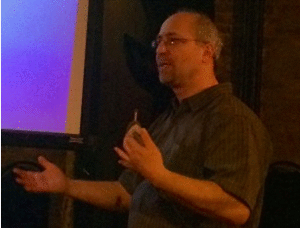
Life Matters Media photo credit. [/one_half] “Was that a one-glass slide? Or a two-glass slide?” I called over to an attendee, gently teasing, as I advanced to the next photo in my presentation. He was all but hiding in the corner. This was the one who had brought in a bottle of wine to our cabaret-style theater where we were holding the event, Science to Humanity: The Autopsy. He had come accompanied by some friends, but really a glass of wine (or two, or three, or a bottle) is what he thought he would need to get through experience. I was just checking in on him.
He smiled.
“I’m good!” he called out.
I was glad to know our at-first-fearful gentleman was doing well. Our attendees always do.
People really don’t know what to expect when they come to an autopsy class. For most, that’s just right. What they get is so different from what they ever imagine.
The class is respectful, paced gradually, engaging and set with a warm, open tone. Who would have thought that the room often fills with laughter? It’s the laughter comedic improvisers know comes from the place, “I recognize that from life.”
This makes sense in a class about the autopsy, perhaps not so paradoxically. The autopsy is about closure. And closure is human. This is a class where people connect.
I have been giving this class since 2012 and we are delighted to now be moving to the International Museum of Surgical Science. It is a milestone for us. We are honored to be able to hold the event in such a respected venue, and looking forward to continuing our outreach.
The class began on the 84th floor of the then Sears Tower — my office space at the time. Our first attendees were a young couple, and that was it. The young man had called me in seeming desperation hours before.
“I missed the ticket deadline! Can we come?” he inquired.
“Of course,” I responded, and called the office to reschedule the room reservation I had just cancelled.
And so, with a bit of a hurry, the first class was held with the three of us. Slide after slide, question after question, proceeded; explanations turned into stories; and, as it always does, the class became an experience. The man ultimately disclosed that his mother had had the same procedure I had shown in one of my slides — placement of a gastrostomy tube. The slide showed a medical mishap. I gasped, fearing what he might infer about his mother’s experience, and I quickly reminded him that I see cases only when things “go wrong” — it’s just the nature of my work. When I was done reassuring him — emphasizing the countless times the procedure had helped patients — he sighed and relaxed. And the flow of questions continued. The young couple walked out hand in hand.
While the class is educational and not a counseling experience, I am aware that what happens there can have an impact. I see this in the letters I receive from attendees and in the reviews.
One attendee wrote months after coming to the class:
“I just wanted you to know that your workshop has been helping in our understanding that [our mother] might not have felt any pain [during her death].”
And a recent reviewer commented:
“I wasn’t considering myself “in bereavement” when attending [the class] although I did lose someone very close to me earlier this year….I was incredibly suprised at how some of the presentation struck a chord with me and answered some questions that I didn’t even realize that I had. I left feeling a sense of peace that I didn’t realize I needed. I didn’t know that certain questions could even be answered.”
So I take the class seriously, keep it “light” — as much as possible for this topic — but respectful and am open to the human experience as well as sharing my own. People leave satisfied.
Our gentleman with the bottle of wine told me at the end that the slides were his favorite part.
“They really weren’t bad,” he said. “I wanted to see some more.”
Next event: July 30. Tickets/information/reviews: here